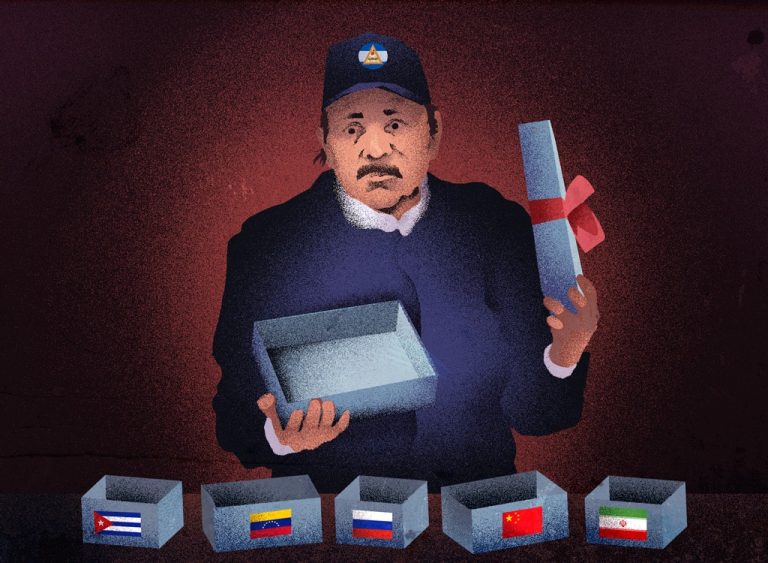25 de enero 2023

News About Sheynnis Palacios Not Covered by Media Operating in Nicaragua

PUBLICIDAD 1M
PUBLICIDAD 4D
PUBLICIDAD 5D
The regime's political 'friends club', whom Daniel Ortega fiercely defends, offers no help to Nicaragua's economy.

Daniel Ortega's political allies do not finance his dictatorship
Daniel Ortega boasts of being part of an exclusive club of political allies, about whom he wastes no time in displaying a shocking political servility, dedicating flowery compliments in his public speeches.
However, this "friends club" –made up of Cuba, Venezuela, Iran, Russia, and recently joined by mainland China– does not reciprocate such enthusiasm with Ortega's regime, and does even less in terms of economic collaboration, donations or loans. That adds up to zero in the last five years, the same period in which the regime has begun to lose the support of the democratic international community, which has condemned its brutal repression and massacre against the citizen protests of the April 2018 Rebellion, and currently continues to demand the immediate release of the prisoners of conscience.
Beyond speeches loaded with ideological rhetoric or prefabricated communiqués, the countries that are aligned with the dictatorship of Daniel Ortega and Rosario Murillo have not functioned as the economic alternative needed by the regime to circumvent the financial hemorrhage of its coffers due the reduction of loans, budget support and donations caused by the severe international self-isolation in which the regime is trapped.
A data analysis by CONFIDENCIAL, with the General Budget of the Republic reports from 2018 to 2023, confirmed that the contribution of the regime's friends club in the line item of donations or loans is zero.
Even China, the second most powerful economy in the world and therefore the richest member of the regime's friends club, does not appear in the General Budget for 2023, despite the propaganda unleashed by the regime since it announced the resumption of diplomatic relations with the Asian giant in December 2021.
Ironically, Taiwan, the small island that China claims as its own and which the regime expelled to favor the reestablishment of diplomatic relations with the Asian power, had been one of the main donors to Nicaragua's finances in the midst of the dictatorship's crisis of isolation.
In fact, more than a year after the break with Taiwan, the so-called rebel island continues to appear in the list of donors to the regime's coffers in the 2023 General Budget, due to the carry-overs of the disbursements programmed since 2020.
The January-November 2022 Budget Expenditure Report of the Ministry of Finance and Public Credit detailed that in that period, the Ortega regime spent 349.1 million cordobas of "leftover funds" from Taiwan, one year after the rupture with the rebel island. The regime received from China-Taiwan those 349.1 million córdobas as "leftover income received in 2021", of which it spent 68.5%. The report reveals that, based on this amount, the island of Taiwan was Nicaragua's second largest foreign donor in 2022.
Meanwhile, the regime's "friends club", in addition to its zero contribution to Nicaragua's finances, has not been interested in capitalizing on the trade agreements signed with the dictatorship.
These agreements are, so far, the only mechanism by which the dictatorship's battered finances could be injected with resources from these countries in an attempt to overcome the dark economic outlook for 2023.
A report by the Economist Intelligence Unit forecasts economic growth of 1.8% in Nicaragua in 2023, while the World Bank and the Economic Commission for Latin America and the Caribbean predict that it could reach 2.1%.
These projections are insufficient to lower poverty rates in the country, especially in a context in which the regime's sources of international financing are closing. The lack of employment, high inflation and biting poverty continue to run rampant as a consequence of the regime's political decisions.
A CONFIDENCIAL report released on January 2, 2023, says that 328,443 Nicaraguans were forced to leave their homeland in 2022. This figure exceeds the previous record of 161,269 Nicaraguans who left in 2021.
Specialists consulted by CONFIDENCIAL for previous reports explained that although forced migration translates into an increase in remittances –which reached a record $2.58 billion in 2022 according to Central Bank figures-- dependence on remittances for develop economic growth, "is a recipe for failure, since economies based on service and consumption are usually very small, and work until the economy needs to diversify".
In 2022, Nicaragua signed several trade agreements, mainly with China and Iran, which, to date, have not produced concrete economic results, despite being in effect for several months.
That year, trade with China barely exceeded $11.3 million. In contrast, the United States, Nicaragua's largest trading partner, and with which the regime maintains an open confrontation, registered $1.43 billion in exports in the same period.
Reports released on Twitter by the U.S. Embassy in Nicaragua informed that the United States registered almost US$5 billion in bilateral trade, just between January and July of 2022. "The U.S. represents more than 60% of Nicaragua's exports (when including the Free Trade Zone) and 35% of its imports," claimed one of the reports published by the Embassy in mid-October 2022.
On May 7, 2022, during the visit of Iran's oil minister, Javab Owji, to Nicaragua, memorandums of understanding and contracts were signed for the supply of oil and agricultural inputs. In addition, Owji said that they would study the possibility of investing in the failed "Bolivar's Supreme Dream" refinery, a $4 billion project conceived in 2007 by then Venezuelan President Hugo Chávez, which was reduced to a storage plant in which $510 million was invested.
With China, the Agreement for the Incorporation of Nicaragua to the Silk Road and the Early Harvest Agreement were signed, in addition to the beginning of negotiations for the signing of a Free Trade Agreement.
To date, the official reports of the Treasury and Public Credit Ministry do not reflect that Nicaragua's trade with China has increased after the signing of these two agreements. Regarding the Free Trade Agreement, the conversations that began at the beginning of September 2022, according to the regime's information, are being kept secret, with no information about how they are advancing.
On December 1, 2022, Nicaragua and Russia announced the signing of agreements in areas such as land transportation, customs and information and communication technologies, in addition to an agreement on the use of atomic energy, which even prompted a warning from the United States. However, in strictly economic matters, the only concrete exchange with Russia to date is the occasional shipment of wheat flour.
The case of Venezuela is the most curious of all. The South American country was Nicaragua's second largest trading partner in 2016, an exchange propped up mainly by the oil agreement between the two countries. However, the collapse of international hydrocarbon prices led Venezuela to cut off the favorable conditions for Nicaragua for the purchase of oil, and that in turn ended the trade bonanza between the two nations.
Economist Enrique Sáenz believes that this trend of much talk and zero contribution to Nicaragua's finances by Daniel Ortega's friends club will continue in 2023.
"These are not the times of the socialist or social democratic solidarity of the 1980s. Each country has its own particularity. For example, the agreements with Iran have been false offers. Ortega has been in power for 16 years and there has been nothing significant coming from the Iranians. In the case of Russia, if they did not financially support Nicaragua when they were not in crisis such as with the invasion of Ukraine, there's even less chance now that they are looking for help, crying "throw water on me, I'm burning up," said Sáenz.
"The case of Venezuela is emblematic," Sáenz added. "Ortega used to buy oil from Venezuela when Venezuela gave concessional conditions. When the concessionality ended, Ortega began to buy from the United States, which, according to him, is the 'enemy of humanity.'"
Regarding the newest member of the club, Sáenz points out that they should take as an example how China has acted with Panama, Costa Rica and El Salvador –economies more booming than Nicaragua's– to establish the type of economic relationship that can be expected from the Asian giant.
"It's not part of Chinese culture nor of its foreign policy to go around giving away money, much less to someone like Daniel Ortega. There are no 'ideological affinities' as Ortega claimed at the time. Chinese culture prefers long term projects. What can Ortega offer in that regard when he's head of a regime that instead of displaying guarantees of continuity shows signs of decomposition?", Sáenz asked.
Ortega justified the severing of diplomatic relations with Taiwan, referring to the existence of an alleged "revolutionary twinning" and a historical political and ideological affinity with People's China.
Sáenz also points out the geographical and logistical issues that make it unfeasible to implement trade agreements with countries such as China, Iran and Russia.
"You can't ignore the objective factors involved in developing trade agreements. First, transportation costs, freight, insurance. For example: to send 50 tons of coffee to Iran, it is much cheaper to buy it in a closer market. You also have to take into account the trade routes, how many ports do you have to go through to take products to Iran, China or Russia? This does not guarantee competitive prices," Sáenz explained.
However, Ortega never misses an opportunity to defend or support any of the members of his friends club when they are involved in a diplomatic situation. Thus, he sought to ingratiate himself with China by protesting Nancy Pelosi's visit to Taiwan, and before that he supported the illegal referendums promoted by Vladimir Putin's government to annex Ukrainian territories.
At the end of 2022,Ortega also sent his foreign minister, Denis Moncada Colindres, to Iran to strengthen ties of friendship with "that brotherly government", as it was described by Moncada. This was at the same time that Iran authorities unleashed a round of hangings of citizens for participating in protests, accusing them of the "crime of treason", similar to the political trials undertaken by the dictatorship in Nicaragua.
This article was originally published in Spanish in Confidencial and translated by our staff.
PUBLICIDAD 3M
Confidencial es un diario digital nicaragüense, de formato multimedia, fundado por Carlos F. Chamorro en junio de 1996. Inició como un semanario impreso y hoy es un medio de referencia regional con información, análisis, entrevistas, perfiles, reportajes e investigaciones sobre Nicaragua, informando desde el exilio por la persecución política de la dictadura de Daniel Ortega y Rosario Murillo.
PUBLICIDAD 3D